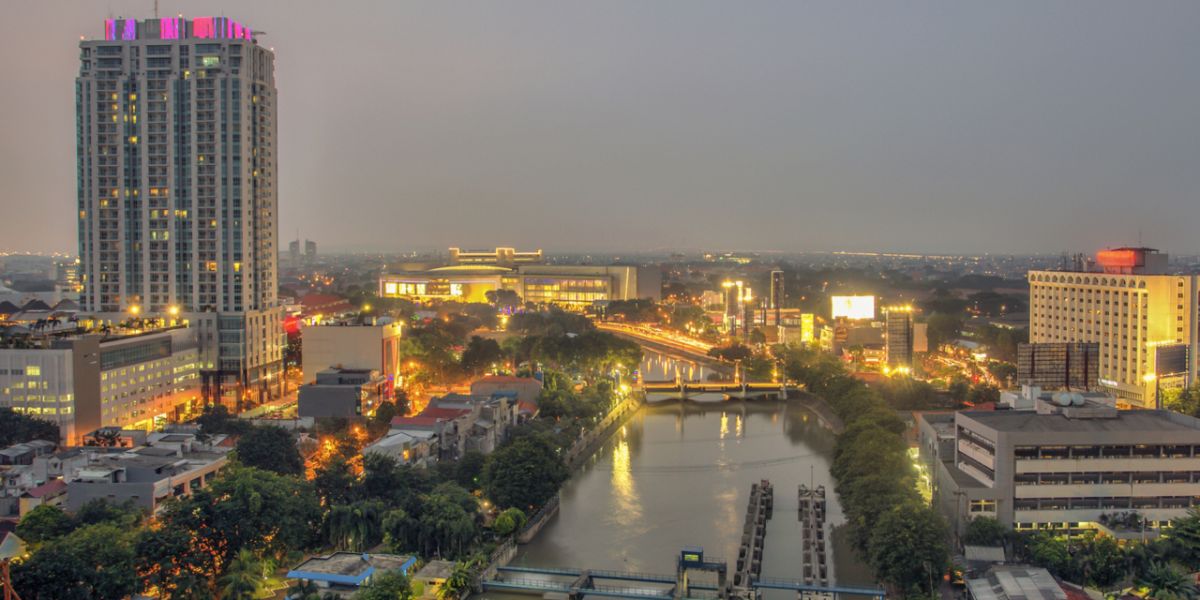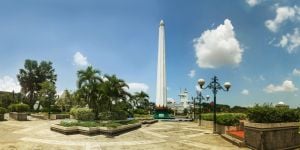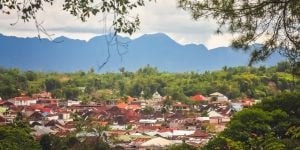
The second largest city in the Indonesian archipelago, Surabaya is one of the most important commercial and industrial centers in the country, but it still lags far behind the huge metropolis of Jakarta. The city is home to over 3 million souls, while it counts 5.6 million for the wider urban metropolis and covers a total area of 326 square kilometers. Its rapid development during the last 20 to 30 years has triggered some problems such as traffic congestion and heavy pollution. For this reason, the city does not have the idyllic image of a tropical paradise that is usually associated with the archipelago.
Indeed, as a modern and industrialized city, the congested capital of East Java does not appeal to everyone. However, it delivers an authentic Indonesian experience. Away from the main tourist sites, Surabaya is perfect for those who can look beyond the pollution and traffic
congestion issues. The city stands out for its impressive, rundown Dutch architecture, as well as its gastronomic delights. Moreover, Surabaya is also an excellent starting point for exploring the many interesting tourist attractions in East Java, such as Malang, the Ijen Plateau and Mount Bromo.
For the local population, Surabaya is a historical city of primary importance. It was here that the battle for Indonesia's independence began in 1945. It is worth mentioning that the Battle of Surabaya took place on November 10, now a nationwide celebration day known as Heroes' Day.
Because of its history. The city is also known as Kota Pahlawan, which in Bahasa Indonesian means "city of heroes". So don't be surprised to find many statues commemorating Independence and national heroes.
As Jakarta, the Indonesian capital, continues to grow, Surabaya's municipal authorities have been promoting the city to local and foreign investors over recent years, focusing on the safety of the surrounding area. This policy has become even more obvious following the economic crisis caused by the Covid-19 pandemic in Indonesia, which has prompted local authorities to open up the city more to overseas investment.
Employment opportunities for expatriates in Surabaya are expected to increase in the city in the coming years. The local labor market is already full of potential jobs for expatriates who wish to find the right fit.
Surabaya's labor market
Located at the mouth of the Brantas River, Surabaya has a port (Tanjung Perak) that accommodates the national navy. It is also one of the most important import and export centers in Indonesia. The city features panoramic views of the waterfront as well as the bridge that connects to the neighboring island of Madura across the strait. Because of its privileged location, Surabaya has been an important commercial center for centuries. Today, the city is considered the economic and commercial center of East Java. Its economy is heavily dependent on retail and also on maritime trade.
Surabaya is a business-oriented city that has long attracted many foreign investors and international companies. For this reason, it benefits from a high-quality infrastructure and a
strategic position that favors international trade. Import-export is, therefore, one of the city's most important economic pillars. The commercial traffic of the port of Tanjung Perak, the main maritime opening of Surabaya, has increased significantly since the beginning of 2022 and the reopening of the borders following the COVID-19 pandemic in Indonesia.
As the city is the commercial and economic hub of the region, most foreigners live in Surabaya primarily for business reasons. Opportunities abound in the manufacturing sector, which is supported by a large workforce and low minimum wage. Moreover, several foreign manufacturing companies have set up shops in Surabaya, and managerial positions are regularly available for qualified professionals.
The city also relies on a strong agricultural sector. The region of East Java is particularly fertile and has a climate that favors agriculture. The area is rich in rice, tapioca, tobacco, rubber, corn and sugar cane plantations, as well as a large milk production factory.
In addition, due to the city's rapid development and large population, the construction and retail sectors are booming. Surabaya is home to some of the tallest buildings in Southeast Asia
and many multi-level shopping malls. The city is expanding rapidly, and urban infrastructure is being upgraded regularly. Some of the most prominent construction companies in Surabaya include SAGA Contractor, Developer Bussid, and Kontractor Surabaya P.T.
Due to its economic importance, Surabaya has a thriving service sector, including financial, banking, IT, communication and management services. ICT is also developing rapidly in the city, with many startups specializing in the development of new digital solutions for businesses and individuals.
If you are a teacher, you should not be short of job opportunities in Surabaya, as is the case in many other parts of Indonesia. Due to the growing number of expatriate professionals residing in the city, several renowned international schools and private institutions have set up bases in
town. If you are interested in teaching English as a foreign language or working at an international school, consider contacting the schools directly or checking job postings and newspapers for available positions.
The health and medical field generally offer interesting opportunities for health professionals in Surabaya. However, you should be aware that with Indonesia's poor health care system, salaries are much better in the private sector. That is why almost all expatriate doctors and other foreign healthcare professionals in Indonesia are either self-employed or work for private clinics and healthcare facilities. If you have enough qualifications and good experience, you should find a job in no time, especially if you are specialized in particular medical fields such as surgery, orthodontics, cardiology, amongst others. There is indeed a high demand for these types of professionals due to the lack of medical expertise in Indonesia.
The tourism sector is certainly one of the economic pillars of Indonesia, but one cannot say the same for Surabaya. Nevertheless, there are a few high-class hotels, especially in the city center. Among the most famous hotels in the city are the Majapahit Surabaya MGalery, the Kampi Hotel Tunjungan, the Bumi Surabaya City Resort, the Great Diponegoro, and the Best Western Papilio Hotel. Most of the guests at these hotels are professionals who have come to Surabaya for business purposes. If you specialize in the hospitality industry, consider checking out the homepages of the city's hotel websites, which regularly post job openings, some of which are for expatriate positions. In addition, many of these hotels regularly organize events and conferences for Surabaya professionals. If you are lucky enough to attend one of these, it could significantly increase your chances of finding a job locally.
Be aware, however, that aside from looking for jobs in the service and commercial sectors, you may have to dig a little deeper to find other job opportunities in Surabaya. In addition, you should be also aware that Indonesia remains a rather closed country when it comes to expatriate employment, except in a few areas where foreign talent is in high demand. If you are looking to work in Indonesia, you should know that companies are required to always justify the choice of hiring an expatriate rather than a local citizen for a particular position.
How to write your CV in Indonesia
If you are looking for a job in Surabaya, make sure that your CV is up to date, that it highlights your main assets, and above all, that it is adapted to Indonesian standards. Indeed, as anywhere else in the world, CVs in Indonesia must be presented in a strict format in order to be acceptable to potential recruiters. Most of the time, résumés that are not up to the local standards end up directly in the trash.
In Indonesia, a Curriculum Vitae:
- Must be only one page long
- Must include a formal but attractive photo of yourself
- Be concise and provide personal information only if necessary
- Summarize your key strengths
- List your general skills
- Contain your contact information and link to your LinkedIn profile.
While a LinkedIn profile may seem overkill and not mandatory to you, be aware that this social network is used by most HR professionals in Indonesia. Its popularity is such that almost all recruitments are nowadays made through it. Therefore, make sure that your LinkedIn profile is up to date, complete, and that it highlights your professional attributes.
As far as personal information is concerned, avoid going overboard and disclosing everything about your life. Mentioning that you are married and have children should be more than enough. If you are involved with a charity, you should mention this as well, but there's no need to give details about your medals from intercollegiate games or the number of siblings you have.
If you have previously worked for a prominent company, try to highlight this information and explain how this experience has helped you gain more knowledge in your field of expertise. Finally, try to keep it simple and don't use bright colors for your resume paper, as this may be considered a sign of superficial vanity in Indonesia.
Finding a job in Surabaya
Many expatriates working in Surabaya are there through a business transfer and are employed by international firms with branches in the city. So don't hesitate to apply for a transfer if the company you work for has a local office.
If you cannot benefit from an internal transfer within your current company, boost your job search in Surabaya by registering on professional websites and forums, such as JobsDB.com or Expat.com. You can also join professional social networks, such as LinkedIn, to follow international companies in your field.
One of the main ways to find a job or get a better career position is to participate in the many networking events that are regularly held in Surabaya. Remember to bring a stack of business cards and hand them out to each new person you meet, as is the Asian tradition. Be mindful, however, to never present your card with your left hand, as this is considered offensive in Indonesia. You can also learn about Indonesian traditions and customs, both in and out of the office, for example, by reading and asking questions in our expats in Indonesia forum.
Useful link:
We do our best to provide accurate and up to date information. However, if you have noticed any inaccuracies in this article, please let us know in the comments section below.








